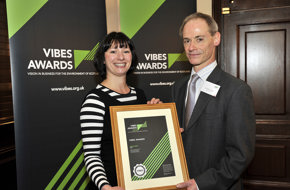Highlights
- Has reduced the amount of waste going to landfill by 75% over the last 4 years.
- Biomass boiler installed in 2000, providing central heating and hot water for Winton House.
- Boiler fuelled by sustainable woodchips generated from the poorest timber on the estate.
- Woodchips are carbon neutral, saving around 100 tonnes of carbon a year.
- The 850 acres of forestry and surrounding farmland absorb around 2500 tonnes of carbon from the atmosphere, equivalent to carbon emissions from 250 average households.
- Winner of a Green Tourism Business Scheme gold award.

Winton House is a castle and stately home near Pencaitland in East Lothian, which has been a high quality, ‘exclusive use’ hospitality venue since 2001, hosting bespoke private and corporate events, and employing nine people. Business activities include parties and celebrations, dinners, conferences and meetings, activity days and team-building events (e.g. clay shooting), bespoke weddings, and catered and self-catering accommodation (the House sleeps 16 people and two nearby country houses sleep 26 people).
The business is committed to low impact, sustainably managed and environmentally responsible best practice across all products and services. Winton House has a range of environmental objectives, including becoming carbon neutral, monitoring energy efficiency, providing recycling areas, using local produce and eco-friendly products and promoting biodiversity throughout the estate.
The judges highlighted that a strong commitment to the building, its contents, the estate and the local community was evident during the site visit, and is a driving force in all the decisions taken. The ethos of the business owes much to the owner who, for example, installed a wood-chip biomass heating system for the house and nearby cottages as early as 2000—the first stately home to do so. All wood for the heating comes from the estate and efficiency has been improved by chipping on a monthly basis. Having an efficient and effective heating system is important for residents and guests, but also for maintaining the correct environment for valuable works of art, old books and furniture.
An innovative new biomass system was installed in 2013, and will deliver additional environmental and financial benefits, for example the oil-fired back-up system will no longer be required and there will be more heating controls in the house to reduce wasted heat.
Winton House began monitoring fuel consumption as part of its membership of the Green Tourism Business Scheme (GTBS). It calculates savings by dividing annual fuel costs with the number of guests to produce a cost per guest. In 2010, the cost per head was £4.58 but was reduced to £3.47 per head in 2011— a 14% reduction.
The judges were impressed that the company’s policy is to use local produce, local trades and services, and local staff wherever possible. All outside caterers have to agree to Winton House’s local produce requirements, and it is estimated that, overall, Winton House invests about £500,000 annually in the local economy.
The judges noted that the business consists of a small team and, as such, there is a lot of contact and good working relationships between staff. For example, cleaners have been trialling ‘green’ cleaning products—those that work are kept and those that don’t are not used again. The judges acknowledged that the involvement of staff in decision-making can only help to develop good practice.
Winton House has a zero waste target for 2018—it has reduced its waste to landfill steadily and is looking at removing the final waste streams that remain after recyclables are removed.
The commitment to environmental good practice is also evident from having achieved the standards necessary for a GTBS gold award and the Green Business Network (three ticks). The GTBS gold award has been useful in highlighting Winton House’s credentials and, in particular, useful for marketing, especially in relation to certain European countries. The judges have recommended that the success in the VIBES awards, and its other green credentials, should be used to further promote the business.
The staff showed an innovative approach to the running of the business, from the installation of a heating system that has led the way for a number of historic buildings to follow, to the introduction of dog-sledding as an outdoor activity. The judges were impressed with the staff’s creative spirit and hope that it can continue to be nurtured for the future of the business and the building.